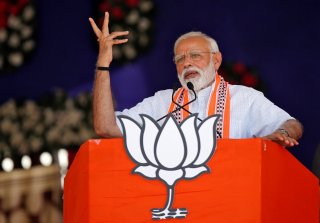Modi’s India Came Out of 2023 On Top
In domestic politics, economics and international clout, Indian Prime Minister Narendra Modi enjoyed a successful 2023.
In domestic politics, economics, and international clout, Indian Prime Minister Narendra Modi enjoyed a successful 2023. At home, his Bharatiya Janata Party (BJP) won most state elections. Regionally, India passed China to become the most populous country — and India’s GDP growth rate underscored her aspiration to replace China as the world’s factory. Globally, Modi was courted by all sides. Even space cooperated when India landed a craft on the moon.
Foreign affairs took center stage. In 2022, India refused to condemn Russia’s invasion of Ukraine and increased purchases of Russian oil. In 2023, India seemed more adept at balancing its competing alignments. In May, Modi met with fellow leaders of the Quad while at the G7, where he was an invited guest. In June, India signed a landmark defense cooperation agreement with the United States, and Modi received red-carpet treatment at a state dinner in Washington.
But in July, India hosted the ‘other side’ at the Shanghai Cooperation Organisation — which includes Russia and China and just added Iran. In August, Modi attended the landmark BRICS summit in South Africa. Here, the BRICS (Brazil, Russia, India, China, and South Africa) grew to include many states unfriendly to the United States, and discussed reducing their dependence on the US dollar.
In September, the G20 summit in Delhi came full circle. In the absence of Russia or China, India’s relationship with the United States took center stage. The event, which India billed as a meeting focused on the Global South, produced three notable pronouncements.
Unlike 2022, references to Ukraine in the joint declaration were more limited and buried in a long list of climate and developmental goals. US President Joe Biden announced funding to develop a new trade route connecting India to Europe via the Middle East. Finally, in a boost to India’s leadership aspirations, the African Union was made a member.
The afterglow of the G20 was short. Weeks later, Canadian Prime Minister Justin Trudeau charged that Indian officials were complicit in the murder of a Canadian naturalized citizen active in the Khalistan movement, which seeks an independent Sikh state in India’s Punjab. India responded with indignation and diplomatic retaliation, while Indians largely attributed the charge to Trudeau’s ostensible political dependence on the Canadian Sikh community.
Then in December, the United States charged an Indian official with attempting to hire an assassin to kill another Khalistan activist, a US citizen. With CIA director William Burns heading to Delhi to discuss the matter, the charge that India kills Sikh activists overseas had the potential to upend the Modi government’s diplomatic progress. Notably, India’s loud protests at the Canadian charges have been replaced with muted assurances that the actions were not government policy, reflecting the much higher costs of conflict with the United States.
Domestic politics intruded on foreign policy in other ways. India jeopardised its bid for soft power by banning rice exports over political concerns about food price increases at home.
Even more brazenly, India scheduled a G20 working session on tourism in Kashmir — a region claimed by Pakistan, with an active insurgency and whose special autonomy the Modi government controversially revoked. Official invitations to the G20 used ‘Bharat’ — the Sanskrit-derived Hindi name preferred by Hindu nationalists — rather than ‘India’. This sparked speculation the BJP was getting ready to drop the name ‘India’, though both names are recognized in the Constitution.
If Indian agents are assassinating Khalistan activists, it speaks to something larger. Even if operations were not sanctioned by political leaders, they suggest an out-of-control security apparatus empowered by the arrogance and paranoia that characterizes the Modi government at its worst. The Khalistan movement has no real support in India today, so a campaign of assassinating diasporic activists is a vast overreaction.
This arrogance and paranoia continue to target dissenting voices and inconvenient news. Through official and unofficial means, film icons, novelists, internet users, civil society organizations, and even opposition politicians felt the pressure.
In May, a horrific gang rape committed during ethnic violence in the BJP-ruled border state of Manipur was covered up by local police and an internet blackout until a video of the crime went viral worldwide. In 2023, Reporters Without Borders downgraded India’s ranking on press freedom again, from 150 to 161 of 180 countries.
In March, Indian National Congress leader Rahul Gandhi was expelled from Parliament after his conviction on spurious defamation charges, a conviction later suspended by the Supreme Court.
Gandhi’s expulsion galvanized the fractured opposition into a new alliance. But this alliance failed to hold in November’s state elections, a reminder of the obstacles to forging a united front against Modi in 2024. Congress did beat a regional party to take power in the southern state of Telangana and had earlier defeated the BJP to recapture neighbouring Karnataka, but the party lost power in three northern Hindi-speaking states, arguably because of its refusal to share seats with its putative allies.
The odds strongly favor Modi’s reelection to a third consecutive five-year term, which no one since the first prime minister, Jawaharlal Nehru, has achieved. But it is not a foregone conclusion. In India’s fractured party landscape, elections are won and lost as much by party alliances as by shifts in popular sentiment.
Popular sentiment is more closely tied to food prices and other domestic issues than international triumphs. And hubris could yet lead the Modi government to commit a fatal error. But unless Modi flies too close to the sun, it is difficult to see him falling in 2024.
Arun Swamy is Professor of Political Science at the University of Guam.
This article is part of an EAF special feature series on 2023 in review and the year ahead.
This article was first published by the East Asia Forum.

